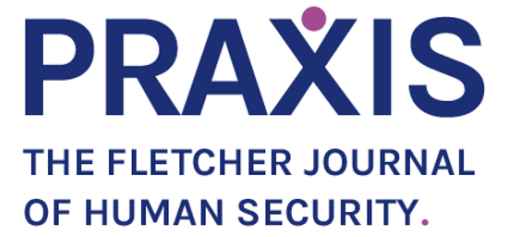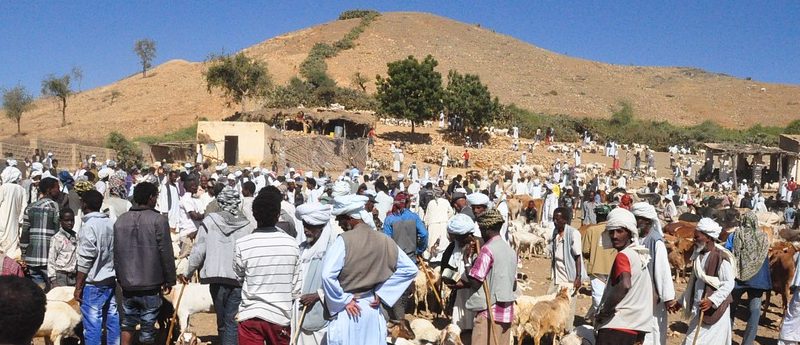Cactus Fruit Futures
Cactus Fruit Futures
A Gender Analysis of the Gaps in Existing Literature on the Evolution of Identity Creation within Eritrea and the Eritrean Diaspora
by Mirielle McMillin, Fletcher MALD 2017
Cactus Fruit Futures, refers to the Tigrinya word, beles, or cactus fruit, commonly sold in Eritrea during the summer. Members of the Eritrean diaspora are nicknamed beles since, like the fruit, they appear in Eritrea during the summer months; cactus fruit futures allude to the mass migration of Eritreans in search of the freedom and prosperity achieved by their counterparts in the diaspora. The thick skin of beles fruits is covered in hundreds of painful spines, but the sweet flesh inside the fruit is much beloved by Eritreans, who know how to properly handle the fruit to expose its flesh. Beles are representative of Eritrean people’s struggle to find new opportunities despite widespread feelings of hopelessness associated with a lack of economic and social mobility enforced by state policies.
While living in Ethiopia, I met an Eritrean man who had newly escaped from Eritrea after a five-year imprisonment. He and his brother planned to journey north and eventually cross the Mediterranean into Europe. His story left me with several unanswered questions, including where were the women? He and his brother had escaped, but what about the family they left behind?
An estimated 5,000 people flee Eritrea each month in search of better lives abroad. I’m seeking to map out the political and hierarchical structure of Eritrea under the Eritrean People’s Liberation Front (EPLF), and its impact on the formation of identity as experienced by Eritrean society within Eritrea, during migration, and within the Eritrean diaspora community. This consolidated discourse analysis aims to illuminate gaps in migration narratives and create a framework which informs an analysis of identities inclusive of those who were previously invisible in dominant Eritrean migration discourse. In order to form a more complete picture, this paper looks at gender roles, state nationalism and oppression, and migration.
An analysis of gender roles details gender identities entirely constructed and enforced by patriarchal and heteronormative societal expectations. Although gender equality, as advanced by the EPLF, was ostensibly beneficial and empowering for women, EPLF notions of gender equality were the product of Marxist ideals, and they were created and enforced by the male leadership. The experiences of women, including their roles as tegadelti fighters in the EPLF and their experience with reintegration, are contextualized by the experiences and privileges of Eritrean men. While the participation of female fighters effectively reshaped gender norms and expectations, these advancements were subsumed by national priorities once the EPLF was successful. The privilege experienced by men in turn dictates acceptable male behavior in a way that suppresses individual identity.
State oppression in Eritrea manifests in the form of indefinite national service. Under the Warsai-Yikealo Development Campaign (WYDC), Eritrean youth are required to serve in the national service for eighteen months, but in reality, this service requirement is indefinite. National service aims to promote economic development and unify Eritreans; it is meant to create hadish hibreteseb mimsrat, or a new society. The government justifies the indefinite nature of WYDC with claims of the inevitability of another war with Ethiopia. This analysis looks at the individual struggles faced by men and women alike, their coping strategies, and the effects the national service and oppressive political atmosphere could have on the future of Eritrean society, government and identity. The national service interferes with education and pastoral production and subsistence farming, both of which contribute to the lack of livelihood opportunities. This lack of livelihood opportunities and continued abuses from the state indicate that migratory flows will not cease.
The longstanding prevalence of migration systems leads to a robust diaspora with complex political and individual identities. The relationship of the Eritrean diaspora ranges from highly supportive, to ambivalent, to critical. Collective organizing initiatives are largely dependent upon diaspora motives and personal experiences within Eritrea and within host communities. Individual identities have yet to be adequately studied, and further studies should consider that despite homogenizing factors, individual identities will vary greatly depending on factors including time since migration, gender, and host country norms.
Overall, current research tends to parallel the Eritrean state discourse of one Eritrean identity and fails to locate the individual within the Eritrean context. Privileging the complexity of the individual over the complexity of national identity and individual testimony over conventional research sources will produce a clearer image of which stories are not being told in the migration narrative. Only with this more accurate representation of larger social groups can researchers understand Eritrean migration and the progression of the lives of migrants.
This is adapted from a larger study produced in April 2017. For the full paper click here.
Mirielle McMillin is currently an International Development Fellow with Catholic Relief Services in Benin. She has a BA from Boston College and an MA from The Fletcher School of Law and Diplomacy, where she studied gender analysis and human security. She served as a Peace Corps Volunteer in Ethiopia from 2013-2015.

